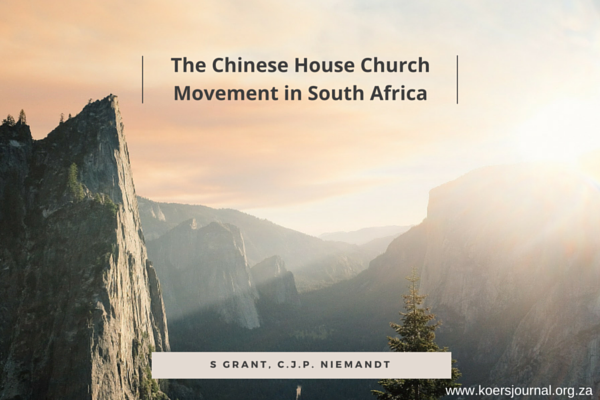Abstract
Die Chinese huiskerkbeweging in Suid-Afrika
Die doel van hierdienavorsing is om die Chinese huiskerkbeweging in Suid-Afrika by wyse van akademieseondersoekaan die ordetestel en ‘n inleidendebesprekingtebied van hierdiebelangrikegebeurtenis in sendingwetenskap.
Hierdie navorsing behels van die heel eerstebeskrywings en navorsingoorhierdiehaasonbekendeverskynsel. Die besprekinggeskiedaan die hand van Alan Hirsch se konsep van apostolieseimpak en die sogenaamde ‘Jesus People’-beweging, toegepas op Chinese huiskerkein China en Suid-Afrika. Die navorsingskets ‘n kortoorsigoor die kerk in China om sodoendekontekste skep vir die gebeure in Suid-Afrika. Die inleidendebespreking van die Chinese huiskerkegeskiedaan die hand van ‘deelnemendewaarneming.’ Die navorsingvervolg met voorstellevir die verdereontwikkeling van die huiskerke in Suid-Afrika.
The Chinese House Church Movement in South Africa
The purpose of the research is to provide an academic introduction to the Chinese House Church Movement in South Africa, and to give a brief description of the importance of this new missiological event – for, even though the presence of these churches is well known, little is known about the churches themselves. This research represents some of the very first explorations and missiological reflections on this phenomenon in South Africa. Therefore, in this article Alan Hirsch’s idea of ‘apostolic genius’ and its connection to ‘Jesus People’ Movements and their impact is explored within the context of the Chinese church, both in mainland China and in South Africa. A brief history of the church in China is provided as background and context for an exploration of the Chinese House Church Movement in South Africa – through ‘participant observation’. Consequently, suggestions are made as to ways in which one can more effectively assist already existing Chinese house churches, as well as with the establishment of more Chinese house churches. As this is a previously mostly ‘unknown’ and/or closed-off community, the research undertaken in this article is of great importance as an initial exploration and missiological reflection on this phenomenon.

This work is licensed under a Creative Commons Attribution-NoDerivatives 4.0 International License.
Copyright (c) 2015 S Grant, C.J.P. Niemandt


_13.png)